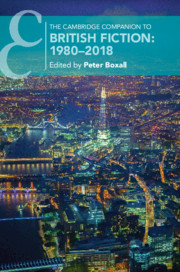Book contents
- The Cambridge Companion to British Fiction: 1980–2018
- The Cambridge Companion to
- The Cambridge Companion to British Fiction: 1980–2018
- Copyright page
- Dedication
- Contents
- Contributors
- Chronology
- Introduction: Framing the Present
- Part I Overview
- 1 The 1980s
- 2 The 1990s
- 3 Post-Millennial Literature
- Part II New Formations
- Part III Genres and Movements
- Part IV Contexts
- Conclusion
- Further Reading
- Index
- Cambridge Companions to …
2 - The 1990s
from Part I - Overview
Published online by Cambridge University Press: 12 June 2019
- The Cambridge Companion to British Fiction: 1980–2018
- The Cambridge Companion to
- The Cambridge Companion to British Fiction: 1980–2018
- Copyright page
- Dedication
- Contents
- Contributors
- Chronology
- Introduction: Framing the Present
- Part I Overview
- 1 The 1980s
- 2 The 1990s
- 3 Post-Millennial Literature
- Part II New Formations
- Part III Genres and Movements
- Part IV Contexts
- Conclusion
- Further Reading
- Index
- Cambridge Companions to …
Summary
It is all too easy to forget that the 1990s were not just the decade of Cool Britannia. Tony Blair’s New Labour only took power in 1997, and the major part of the decade consisted in the slightly embarrassed hangover of a decade of Thatcherism. The 1997 Vanity Fair article that launched the ‘Cool Britannia’ label identified the eminently forgettable face of that lukewarm Britannia as ‘gray-flannel, beans-on-toast John Major!’. Major’s tenure as prime minister between 1992 and 1997 consolidated Thatcher’s break with Britain’s post-war consensus, yet failed to develop a national iconography to convert the fall-out of that rupture into a marketable national brand. This brand arrived later in the decade, when New Labour’s Third Way spun the realities of imperial decline and rampant deindustrialisation as, somehow, good things – as occasions for entrepreneurialism and a patriotic embrace of a demotic national culture. This culture was emblematised by the Britpop phenomenon, as bands like Blur and Oasis indulged in their eclectic recycling of sounds, styles and fashions from three decades of British music – looking back, but not in anger so much as in nostalgic yearning. When, in one of the iconic images of the decade, Oasis’s Noel Gallagher shook hands with Tony Blair at 10 Downing Street in July 1997, the neoliberal reorganisation of the nation that had started in the 1980s finally found its cool.
- Type
- Chapter
- Information
- The Cambridge Companion to British Fiction: 1980–2018 , pp. 32 - 46Publisher: Cambridge University PressPrint publication year: 2019

